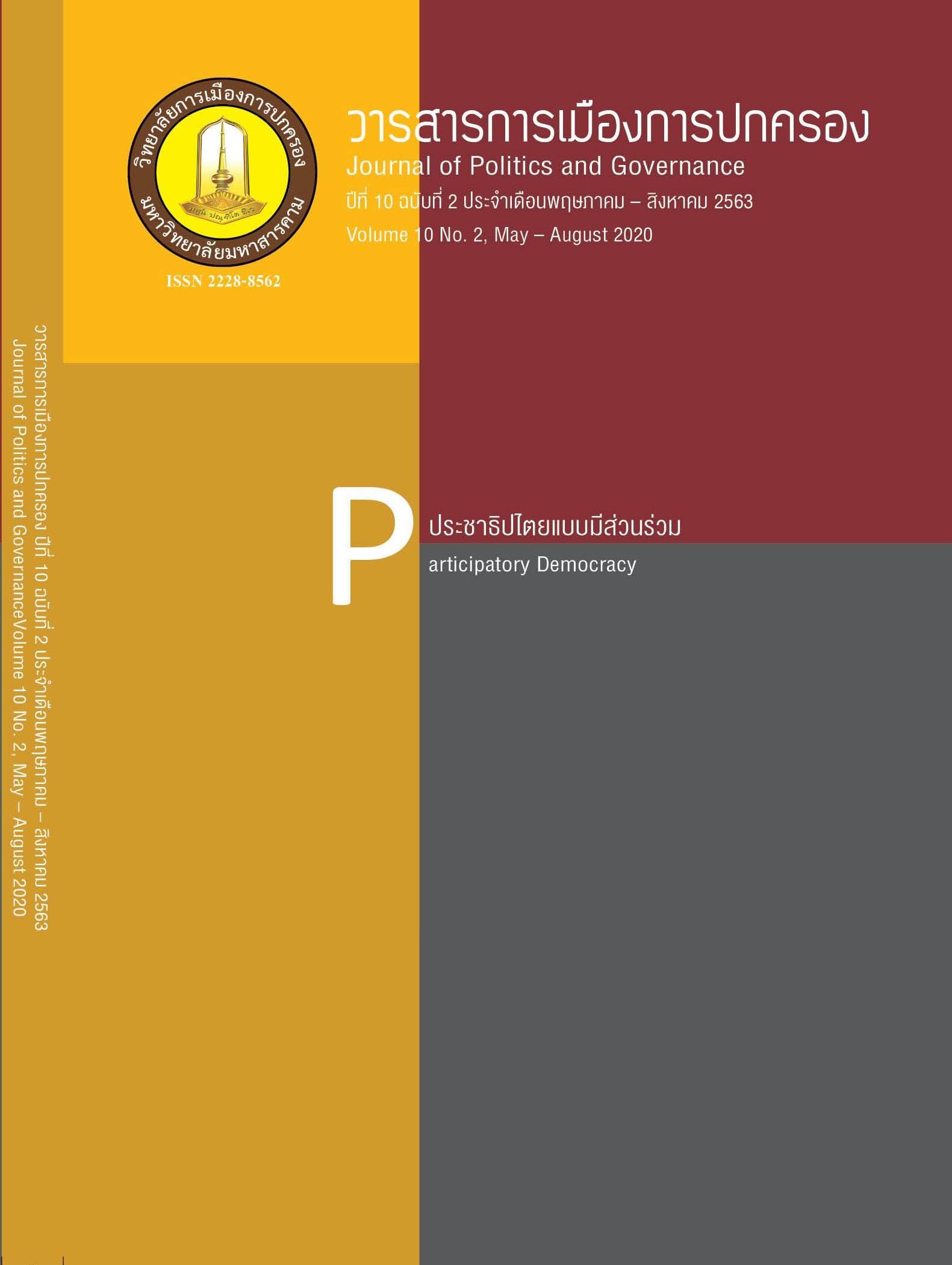Collaborative Governance in Industrial Projects for Sustainable Job Creation in Thailand’s Three Southern Border Provinces
Main Article Content
Abstract
The purposes of this study were (1) to explore the factors or conditions of initiating collaborative governance in the industrial projects for sustainable job creation in the three southern border provinces of Thailand, (2) to examine the process of collaborative governance in such projects, and (3) to investigate the outputs and outcomes of such industrial projects. A qualitative research by using documentary study and in-depth interview of sixteen key informants from public, private, and civic sectors was employed in this study. The results of the study were as follows: (1) the factors or conditions influencing on initiating the collaborative governance could be grouped into two dimensions including the system contexts that were composited of policy and legal framework, socioeconomic and cultural, and security issues, and the factor drivers that were composited of interdependence, consequential incentives, and initiating leadership. (2) the process of collaborative governance had a three-dimensional: (a) employing collaborative teamwork with consulting and setting a common practice guideline, (b) enhancing and supporting mutual trust with building trust and commitment between each other, and (c) capacity for joint action by setting procedural and institutional arrangements, and leadership. (3) the impacts of implementing the industrial projects included: the outputs were about buildings, places, developing skills of labors, and professional of managing the factory provided by private sectors, and however, the outcomes were not achieved because of lower employment than specified. This research recommended that (1) Policy and project making to solve economic problems that need to create public adoption and collaboration, (2) reaching a peace agreement between the Insurgent groups and the Thai government as soon as possible, to be able to economic development, and (3) policy priority to solve the problem in Thailand’s Three Southern Border Provinces should balance between security issue and development.
Article Details
References
ชลิตา บัณฑุวงศ์. (2560). เศรษฐกิจและการพัฒนาในพื้นที่จังหวัดชายแดนภาคใต้: การสำรวจเชิงวิพากษ์. ใน อนุสรณ์ อุณโณ (บ.ก.), หนึ่งทศวรรษมานุษยวิทยาและสังคมวิทยากับการศึกษาจังหวัดชายแดนภาคใต้ . กรุงเทพฯ: ศูนย์ศึกษาสังคมและวัฒนธรรมร่วมสมัย.
ดันแคน แม็คคาร์โก. (2555). ฉีกแผ่นดิน : อิสลามและปัญหาความชอบธรรมในภาคใต้ ประเทศไทย. กรุงเทพฯ: โครงการจัดพิมพ์คบไฟ.
พัชรี สิโรรส. (2557). การจัดการปกครองและนโยบายสาธารณะ. วารสารการเมืองการปกครอง, 4(2), 1–12.
ราซีดะห์ ระเด่นอาหมัด และคณะ. (2549). โครงสร้างเศรษฐกิจ สามจังหวัดชายแดนภาคใต้ (รายงานผลการวิจัย). กรุงเทพฯ: สำนักนายกรัฐมนตรี.
วสันต์ เหลืองประภัสร์ นครินทร์ เมฆไตรรัตน์ และเกรียงชัย ปึงประวัติ. (2557). การศึกษาและรวบรวมตัวอย่างการบริหารกิจการบ้านเมืองแบบร่วมมือกัน (Collaborative Governance) ระหว่างภาครัฐ องค์กรปกครองส่วนท้องถิ่น ภาคธุรกิจเอกชน ภาคประชาสังคมและชุมชน (รายงานผลการวิจัย). กรุงเทพฯ: มหาวิทยาลัยธรรมศาสตร์.
ศรีสมภพ จิตร์ภิรมย์ศรี. (2560). ความขัดแย้งชายแดนใต้ในรอบ 13 ปี: ความซับซ้อนของสนามความรุนแรงและพลังของบทสนทนาสันติภาพปาตานี. สืบค้นจาก https://deepsouthwatch.org/th/node/11053
ศรีสมภพ จิตร์ภิรมย์ศรี เชาวเลิศ ล้อมลิ้ม และสวัสดิ์ ไหลภาภรณ์. (2555). เศรษฐศาสตร์การเมืองว่าด้วยการพัฒนาจังหวัดชายแดนภาคใต้ในท่ามกลาง 8 ปีของความรุนแรง. สืบค้นจาก https://www.deepsouthwatch.org/node/2871
ศูนย์เศรษฐกิจการลงทุนภาค 5. (2560). สถิติข้อมูลการลงทุนใน 14 จังหวัดภาคใต้. สงขลา. สืบค้นจาก http://hatyai.boi.go.th
สำนักงานสภาพัฒนาเศรษฐกิจและสังคมแห่งชาติ. (2559). ข้อมูลเศรษฐกิจสังคม. สืบค้นจาก http://www.nesdb.go.th
อนุวัต สงสม. (2552). เศรษฐกิจของภาคครัวเรือนจังหวัดปัตตานี ภายใต้สถานการณ์ความไม่สงบในพื้นที่ภาคใต้. วารสารวิชาการคณะมนุษยศาสตร์และสังคมศาสตร์, 5(2), 37–70.
เอก ตั้งทรัพย์วัฒนา และอรอร ภู่เจริญ. (2552). ปัญหา 3 จังหวัดชายแดนภาคใต้ข้อเสนอแนะทางนโยบาย. กรุงเทพฯ: สำนักพิมพ์แห่งจุฬาลงกรณ์มหาวิทยาลัย.
Ansell, C., & Gash, A. (2008). Collaborative governance in theory and practice. Journal of Public Administration Research and Theory, 18(4), 543–571.
Bardach, E. (2001). Developmental dynamics: Interagency collaboration as an emergent phenomenon. Journal of Public Administration Research and Theory, 11(2), 149–164.
Bevir, M. (2012). Governance: A Very Short Introduction. Oxford: Oxford University Press.
Bingham, L. B., Nabatchi, T., & O’Leary, R. (2005). The new governance: Practices and processes for stakeholder and citizen participation in the work of government. Public Administration Review, 65(5), 547–558.
Bingham, L. B., & O’Leary, R. (Eds.). (2008). Big Ideas in Collaborative Public Management. New York: Routledge.
Bryson, J. M., Crosby, B. C., & Stone, M. M. (2006). The Design and Implementation of Cross-Sector Collaborations: Propositions from the Literature. Public Administration Review, 66, 44–55.
Carlson, C. (2007). A Practical Guide to Collaborative Governance. Policy Consensus Initiative.
Doberstein, C. (2016). Designing Collaborative Governance Decision-Making in Search of a ‘Collaborative Advantage. Public Management Review, 18(6), 819–841.
Donahue, J. D., & Zeckhauser, R. J. (2011). Collaborative Governance: Private Roles for Public Goals in Turbulent Times. Princeton, N.J.: Princeton University Press.
Emerson, K., & Nabatchi, T. (2015). Collaborative Governance Regimes. Washington, DC: Georgetown University Press.
Emerson, K., Orr, P. J., Keyes, D. L., & McKnight, K. M. (2009). Environmental Conflict Resolution: Evaluating Performance Outcomes and Contributing Factors. Conflict Resolution Quarterly, 27(1), 27–64.
Gastil, J. (2006). Communication as Deleberation. In G. J. Shepherd, J. S. John, & T. Striphas (Eds.), Communicationa as...: Perspectives on Theory. pp. 164–173. SAGE Publications, Inc.
Head, B. W. (2008). Wicked Problems in Public Policy. Public Policy, 3(2), 101–118.
Head, B. W., & Alford, J. (2015). Wicked Problems: Implications for Pulic Policy and Management. Administration & Society, 47(6), 711–739.
Huxham, C. (2000). The Challenge of Collaborative Governance. Public Management Review, 2(3), 337–358.
Imperial, M. T. (2005). Using collaboration as a governance strategy: Lessons from six watershed management programs. Administration and Society, 37(3), 281–320.
Koppenjan, J., & Klijn, E.-H. (2004). Managing uncertainties in networks: a network approach to problem solving and decision making. Oxford: Routledge.
Levi-Faur, D. (2012). From “Big Government” to “Big Governance”? In D. Levi-Faur (Ed.), The Oxford Handbook of Governance, pp. 3–18. Oxford: Oxford Univeristy Press.
O’Leary, R., & Bingham, L. B. (2007). A Manager’s Guide to Resolving Conflicts in Collaborative Networks. IBM Centrer for The Business of Government. Washington, DC.
Rittel, H. W. J., & Webber, M. M. (1973). Dilemmas in a General Theory of Planning. Policy Sciences, 4(2), 155.
Roberts, N. (2000). Wicked Problems and Network Approaches to Resolution. International Public Management Review, 1(1), 1–19.
Roberts, N. (2004). Public deliberation in an age of direct citizen participation. American Review of Public Administration, 34(4), 315–353.
Scott, T. (2015). Do all of these meetings matter? Three essays concerning the impacts of collaborative watershed governance. Unpublished Doctoral's Thesis, University of Washington, Seattle, United States of America.
Thomson, A. M., & Perry, J. L. (2006). Collaboration processes: Inside the black box. Public Administration Review, 66(s1), 20–32.
United States Agency for International Development. (2016). Mindanao Youth for Development (MYDEV) Program FY15 Impact Evaluation Report. Manila: U.S. Agency for International Development.
Yang, L. (2017). Types and Institutional Design Principles of Collaborative Governance in a Strong-Government Society: The Case Study of Desertification Control in Northern China. International Public Management Journal, 20(4), 586–623.


